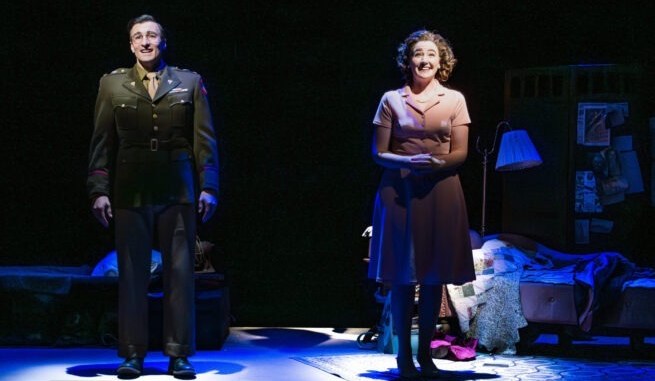
By Marilyn Lester***The song lyric “Forget your troubles, come on get happy” may well be the message of playwright Ken Ludwig‘s Dear Jack, Dear Louise, now playing at 59E59 Theaters. Dear Jack, Dear Louise is very much the love story and panacea we need for these troubled times, the story of another troubled era: World War II. Produced by Penguin Rep Theatre and Shadowland Stages, and directed by Stephen Nachamie, the beguiling tale is based on the true story of the author’s parents’ wartime courtship.
The two-hander grabs attention from the start, never lagging, while building its story with nuance, charming subtlety and humor. Very far from being a fluffy tale of meet-cute love, the play has depth, exploring how a relationship builds over time, especially through powerful, affecting external circumstances and hardship. Alexandra Fortin (Louise) and Michael Liebhauser (Jack) are effectively strong in their splendid and authentic performances as the strangers who become a couple.
The protagonists, Jack Ludwig and Louise Rabiner, begin their correspondence at the behest of their fathers, who are friends and who connect them, suggesting they “meet and get acquainted in a social way.” Jack is a somewhat shy Army doctor stationed in a military hospital in Oregon; Louise is an exuberant aspiring actress living in New York City. Over the course of several years (in r eality, hundreds of letters were exchanged) the letters we’re privy to condense the essence of the correspondence, revealing a plethora of emotions, from the neutrality of being a pen pal to the possibility of romance to the reality of it. Gaps in the correspondence, mainly when the war itself intervenes, bring a relatable array of emotions such as doubt, questioning and anxiety.
eality, hundreds of letters were exchanged) the letters we’re privy to condense the essence of the correspondence, revealing a plethora of emotions, from the neutrality of being a pen pal to the possibility of romance to the reality of it. Gaps in the correspondence, mainly when the war itself intervenes, bring a relatable array of emotions such as doubt, questioning and anxiety.
Nachamie’s direction, which can sometimes border on the frenetic, is none the less solid, supporting the dramatic flow of the piece. This relationship develops in an era far from the internet age of email and texting, cell phones and easy communication. Two people connecting during this period meant dependence on the US mail’s ability to work with the Armed Fo rces in getting letters back and forth from war zones. There’s dramatic license here in the speed at which the letters flow, but really a triviality to intention and purpose. That the interaction is conversational—we might be eavesdropping on phone conversations—brings the action to life. Nachamie also skillfully develops the window we’re offered into the lives of the correspondents— the real-life action that might be happening as each receives and responds to the letters of the other.
rces in getting letters back and forth from war zones. There’s dramatic license here in the speed at which the letters flow, but really a triviality to intention and purpose. That the interaction is conversational—we might be eavesdropping on phone conversations—brings the action to life. Nachamie also skillfully develops the window we’re offered into the lives of the correspondents— the real-life action that might be happening as each receives and responds to the letters of the other.
Aided by subtle use of period music to help define action, and which keeps the pacing lively, the investment of emotion in the exchanges is solidly communicated, so much so that in the mood shift in act two, we’re solidly invested in the pair, especially in their oft-thwarted attempts at actually meeting. A dramatic climax folds into a happy ending that brings tears and wide smiles—and the realization that Dear Jack, Dear Louise is as an effective anti-war story as any, along with the deep and universal human experience of love.
Dear Jack, Dear Louise plays through Sunday, February 16 at 59E59 Theaters, 59 East 59th St., Manhattan. For more information, schedule and tickets, click here.
Photos by Dorice Arden









